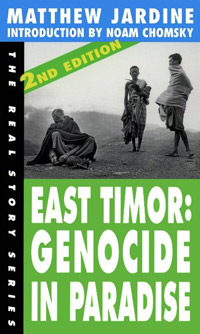East Timor: Genocide in Paradise
By Matthew
Jardine
 This book is one of the best of the various series
of small pamphlet-like books I have. Several of the books like this I've
read have been by Noam Chomsky - and he adds the introduction here. But
Chomsky can ramble and touch too many bases at once, also tending to
assume you recall the details of the incidents he refers too. Not so
with Jardine's succinct work here. It doesn't overreach, but focuses
on a tiny subject and covers it well.
This book is one of the best of the various series
of small pamphlet-like books I have. Several of the books like this I've
read have been by Noam Chomsky - and he adds the introduction here. But
Chomsky can ramble and touch too many bases at once, also tending to
assume you recall the details of the incidents he refers too. Not so
with Jardine's succinct work here. It doesn't overreach, but focuses
on a tiny subject and covers it well.
That tiny subject is the New Jersey-sized island of
Timor, in the southern seas of Indonesia. The book gives an overview
and then addresses East Timor's history chronologically. To sum up, Timor
is basically still reeling from the effects of colonialism - the Dutch
colonized Indonesia, including West Timor, but the Portugese had a trading
colony on East Timor. After the colonial powers left, Indonesia wanted
to absorb Timor, but the East Timorese wanted thir own nation. So Indonesia,
under the brutal General Suharto, committed terrible acts of murder and
oppression against the dissenting Timorese, killing thousands - all with
the support of the Western countries, most notably the U.S. and Australia.
Of course, as in many other global conflicts, the supporting powers had
their own interests at heart - lucrative trading deals with Indonesia
that include the oil-rich seas between Timor and Australia.
While the book dwells exclusively with East Timor,
readers with no former interest in the tiny island should not be put
off. Implicit in the entire story is the integral theme that East Timor's
tragic situation is a useful example of similar conflicts that are being
fought the world over. The concept of an ethnic minority fighting for
independence against an oppressive, Western-backed nation is, in my mind,
the major remaining type of conflict playing out worldwide today. While
each example places the rebelling group somewhere on a range from sympathetic
uprising to unjustifiable terrorism, they are all variations on a theme.
East Timor is particularly useful to understand because its situation,
though complex, is much simpler than other conflicts, mainly due to its
small size. The Isreali-Paelstinian conflict, wars in Chechnya, Sri Lanka,
Northern Ireland, the Phillipines, the North of Spain, Tibet, Kashmir,
Sudan, and even other Indonesian island conflicts all echo East Timor
in surprising, and surprisingly different, ways.
Perhaps the only flaw in the story - I keep calling
it a story because it is presented chronologically and reads fast - is
that it ends in 1999. East Timor has gone through significant changes
since then, and finally seems to be reaching a tentative peace. I read
the second edition of the book (the first was from 1995), and I hope
they publish a third edition soon to incorporate the latest developments.